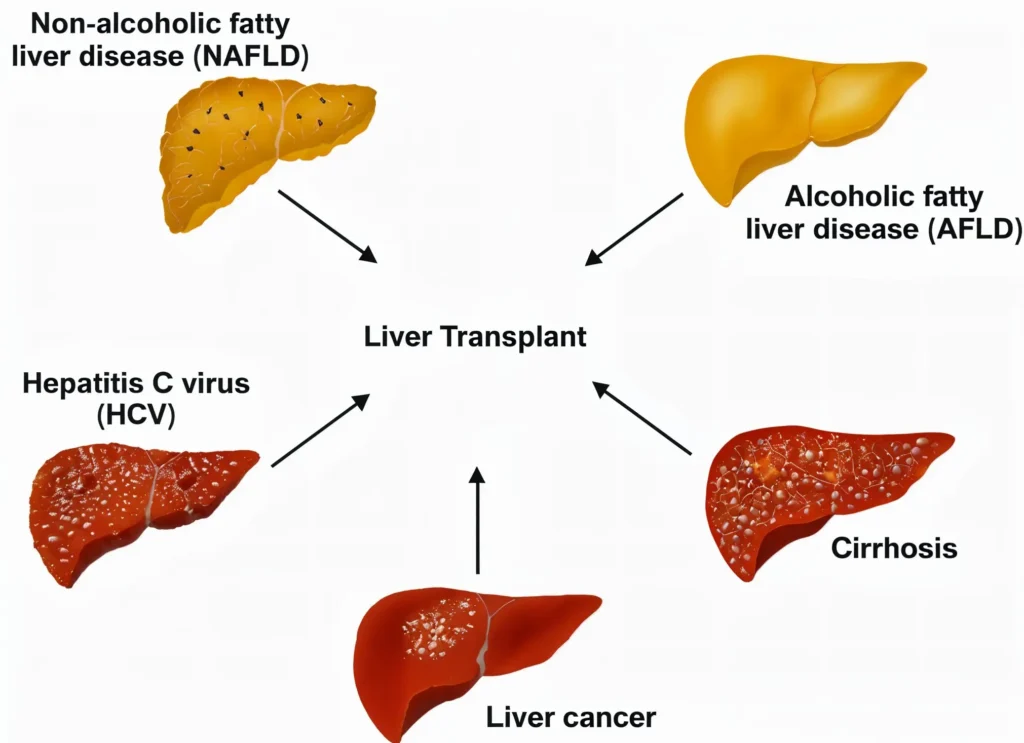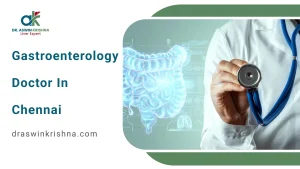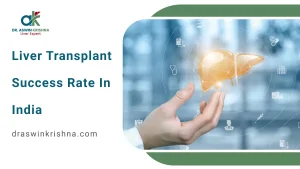Hepatitis C and liver transplant are deeply intertwined when the hepatitis C virus causes significant damage to the liver, ultimately leading to liver failure. Dr. Aswin Krishna, an expert in hepatology and liver transplants, has helped countless patients successfully navigate this journey, from managing Hepatitis C to undergoing a life-saving liver transplant. In this blog, we will explore the connection between hep C and liver transplant, the criteria for receiving a transplant, the procedure itself, and what to expect during the recovery process.
Criteria for Liver Transplant
A liver transplant is usually recommended when the liver is severely damaged, often due to chronic conditions like Hepatitis C. For hepatitis C and liver transplant, specific criteria must be met to determine eligibility. These criteria include:
- End-stage liver disease: This occurs when the liver can no longer perform its essential functions. The patient may experience symptoms like jaundice (yellowing of the skin and eyes), fluid buildup, and bleeding. Without a transplant, the patient’s life is at risk.
- Severe cirrhosis: Cirrhosis caused by chronic Hepatitis C leads to scarring of the liver tissue, which gradually disrupts liver function. When cirrhosis reaches an advanced stage, a liver transplant is often the only solution.
- Uncontrolled complications: Some patients experience severe complications despite ongoing medical treatment, such as encephalopathy (brain dysfunction) or ascites (fluid in the abdomen). These complications can be life-threatening and often necessitate a liver transplant.
Contraindications for Liver Transplant
Certain factors or medical conditions can disqualify a patient from receiving a liver transplant, including hep c and liver transplant contraindications, such as active cancer, severe heart or lung disease, or ongoing substance abuse.
- Active cancer: If the patient has cancer that has spread beyond the liver, a liver transplant is generally not an option.
- Severe heart or lung disease: A stable heart and lung function are crucial for the transplant surgery and recovery. If these organs are not healthy, the risks associated with the procedure are too high.
- Substance abuse: Patients must demonstrate that they can maintain sobriety. Alcohol or drug abuse can damage the liver and complicate recovery after a transplant. A patient must be committed to avoiding substances that can harm the new liver after hep c and liver transplant
Transplant Evaluation
The transplant evaluation is a comprehensive process that ensures a patient is physically and mentally prepared for a liver transplant. Here’s what is typically involved in the hepatitis c and liver transplant evaluation:
- Blood tests: These tests assess liver function, check for Hepatitis C viral load, and screen for any other infections. They help the healthcare team understand how advanced the liver damage is.
- Imaging studies: MRI or ultrasound scans help determine the extent of liver damage, and they allow doctors to visualize the liver and check for any complications such as tumors or bile duct obstructions.
- Psychological evaluation: A psychological assessment ensures that the patient is mentally prepared for the challenges of post-transplant recovery. This includes coping with the emotional and lifestyle changes after receiving a new liver.

Preparation for a Liver Transplant
Before undergoing the liver transplant surgery, certain steps are taken to prepare the patient for the procedure. This preparation is crucial for increasing the chances of a successful transplant and recovery. The following steps are typically involved in preparing for hepatitis c and liver transplant:
- Stabilizing liver function: Patients with advanced liver disease are often treated with medications to stabilize their liver function and reduce the severity of symptoms before surgery. This may include medications to control bleeding or manage fluid retention.
- Vaccinations: It is essential for transplant candidates to be vaccinated against infections such as Hepatitis A and B to prevent future complications and protect the new liver.
- Nutritional support: Maintaining proper nutrition is essential for patients undergoing a liver transplant. Doctors may recommend dietary changes or supplements to improve overall health. After surgery, hep c after liver transplant management also requires attention to nutrition to support the new liver and prevent complications.
Procedure for Liver Transplant
hepatitis c and liver transplant procedure itself are complex and typically take between six to twelve hours. Here’s what to expect during the surgery:
- Anesthesia: General anesthesia ensures that the patient is completely asleep and pain-free during the procedure.
- Liver removal: The diseased liver is carefully removed from the patient’s body. The surgeon takes great care to avoid damaging other organs or blood vessels.
- Transplantation: The donor liver is then prepared and placed into the patient’s body. Surgeons reconnect the blood vessels and bile ducts to ensure the new liver functions properly.
- Closing: Once the new liver is in place and the surgeon has checked for any issues such as bleeding or bile leaks, the incision is closed, and the patient is transferred to a recovery unit.
Taking Care of a New Liver
Once the transplant is complete, the focus shifts to recovery and ensuring the new liver stays healthy. After a hepatitis c and liver transplant, it’s crucial for the patient to take the necessary steps to protect their new liver and prevent complications:
- Immunosuppressive medications: These medications are necessary to prevent the body from rejecting the new liver. However, they also suppress the immune system, which makes the patient more vulnerable to infections.
- Frequent monitoring: After the transplant, patients undergo regular check-ups, including blood tests and imaging studies, to monitor liver function and detect any signs of rejection early.
- Healthy lifestyle: A nutritious diet and regular exercise can help the liver stay healthy. Avoiding alcohol and other substances that could damage the liver is essential for long-term success.
Survival and Life Expectancy
- Post-transplant complications: If the body rejects the liver or if infections occur, the recovery process may be prolonged, affecting life expectancy.
- Managing Hepatitis C: After a liver transplant, it’s crucial to manage Hepatitis C effectively. If the virus returns, it can damage the new liver. Hepatitis C treatment after liver transplant often involves antiviral medications to prevent reinfection.
- Healthy lifestyle: Following a healthy lifestyle, including medication adherence, regular exercise, and a balanced diet, can improve outcomes and increase life expectancy after transplant.
Post-Liver Transplant Lifestyle Changes
- Balanced diet: Focus on liver-friendly foods and managing weight.
- Exercise: Safe physical activity to promote overall health.
- Medication adherence: Strictly following the prescribed regimen to prevent rejection.
- Emotional support: Coping with the psychological effects of a transplant.
Hepatitis C Treatment an After Liver Transplant
After the transplant, hepatitis c treatment after liver transplant remains essential to prevent reinfection. Even if the transplant is successful, the Hepatitis C virus can return, potentially affecting the new liver.
- Direct-acting antivirals (DAAs): These medications are highly effective at treating Hepatitis C and preventing the virus from attacking the new liver.
- Regular follow-ups: Ongoing monitoring through blood tests and check-ups helps doctors catch any signs of reinfection early, including hep c after liver transplant, and ensures the liver remains healthy.
Conclusion
Hepatitis C and liver transplant are closely linked, as Hepatitis C can cause irreversible liver damage that may require a transplant to restore liver function. Thanks to advancements in antiviral treatments and liver transplantation techniques, many patients can now live longer and healthier lives. Dr. Aswin Krishna specializes in providing personalized care to help patients manage Hepatitis C and successfully undergo liver transplants.



